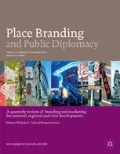The Ministry of Foreign Affairs… “must maintain constant coordination with its representations overseas, with other public entities and the organized civil society, as indispensable elements to give coherence to the actions of the country abroad and translate internal targets in the position it should have and the country image we want to project, as part of a Costa Rican public diplomacy, which can be developed, based on our pillars of foreign policy.” National Development Plan 2015-2018, Alberto Cañas Escalante.
Abstract
This article questions the universality of smart power and substantiates the pertinence of a Costa Rican approach when facing the challenge to generate a Public Diplomacy strategy. The theoretical and empirical analysis of the investigation allows determining the suitability of soft power to provide Public Diplomacy with epistemic consistency in a Small State lacking armed forces such as Costa Rica, which currently is considering to create a Public Diplomacy strategy. To test Nye’s hypothesis, a non-probabilistic exploratory approach was conducted between 2013 and 2014 with 40 career diplomatic officials (representing 20 per cent of the total amount of career officials), as an innovative exercise, considering the extensive academic literature review carried out for this study.




Similar content being viewed by others
References
Acuña, G. (2009) Prensa costarricense y población migrante y refugiada. San José: CONAMAJ.
Bertonha, J. (2009) Hard, soft ou smart Power? Perspectivas para a nova política externa dos Estados Unidos. Meridiano. Boletim de Análise de Conjuntura em Relações Internacionais 47: 16–18.
Braveboy-Wagner, J.A. (2008) Small States in Global Affairs: The Foreign Policies of the Caribbean Community (CARICOM). New York: Palgrave Macmillan.
Cascante, C. (2012) Control jurisdiccional de los actos de política exterior. La Sala Constitucional de Costa Rica (1989–2011). Heredia: Universidad Nacional de Costa Rica.
Cascante, C., Méndez, M. and Moya, S. (2014) Costa Rica y su política exterior. Entre retos coyunturales y problemas estructurales. Heredia: Universidad Nacional de Costa Rica.
Chacón, K. and Corrales, F. (2012) Aporte de la política exterior costarricense al Desarrollo Humano. Paper drafted for the XVIII Estado de la Nación. San José, Costa Rica.
Chacón, K. and Corrales, F. (2013) Accionar de la política exterior costarricense en 2012. Paper drafted for the XIX Estado de la Nación. San José, Costa Rica.
CSIS Commission On Smart Power. (2007) A Smarter, More Secure America. New York: CSIS Press.
Dobles, I. et al (2012) Isla Calero: Nacionalismo, conflicto, discursos. San José: Editorial Arlekín.
East, M.A. (1973) Size and foreign policy behavior: A test of two models. World Politics 25(4): 556–576. doi:10.2307/2009952
Goldsmith, B. and Horiuchi, Y. (2012) In search of soft power: Does foreign public opinion matter for US Foreign Policy? World Politics 64(3): 555–585. doi:10.2139/ssrn.1932478
Hey, J. (ed.). (2003) Small States in World Politics: Explaining Foreign Policy Behavior. Colorado: Lynne Rienner Publishers.
Keohane, R. and Nye, J. (1988) Poder e Interdependencia. La política mundial en transición. Buenos Aires: Grupo Editor Latinoamericano
Krueger, A. and Maleckova, J. (2009) Attitudes and action: Public opinion and the occurrence of international terrorism. Science 325: 1534–1536. doi:10.1126/science.1170867
La Nación. (2014) Nicaragua discute posible impuesto a productos de Costa Rica. 3 March, http://www.nacion.com/economia/empresarial/Nicaragua-posible-impuesto-productos-costarricenses_0_1400059990.html, accesed 15 July 2014.
Méndez-Coto, M. (2012) ¿Poder inteligente? La doctrina Obama y Guantánamo. Heredia: Universidad Nacional de Costa Rica.
Murillo, A. (2011) Canciller Castro ve necesario reconsiderar tradición pacifista. La Nación. 13 January, http://wfnode01.nacion.com/2011-01-13/ElPais/NotasSecundarias/ElPais2649848.aspx, accessed 15 July 2014.
Navas, L. (2014) “No” a impuesto patriótico a ticos. La Prensa. 1 March, http://www.laprensa.com.ni/2014/03/01/economia/184651-no-a-impuesto-patriotico-a-ticos, accessed 15 July 2014.
Nossel, S. (2004) Smart power. Foreign Affairs. March–April, http://www.foreignaffairs.com/articles/59716/suzanne-nossel/smart-power.
Noya, J. (2005) The symbolic power of nation. Place Branding and Public Diplomacy 2(1): 53–67.
Nye, J. (2004) Soft Power. The Means to Success in World Politics. New York: Public Affairs.
Nye, J. (2008) Public Diplomacy and Soft Power. Annals of the American Academy of Political and Social Science 616(1): 94–109. doi:10.1177/0002716207311699
Nye, J. (2008) The Powers to Lead. New York: Oxford University Press.
Nye, J. (2011) The Future of Power. New York: Oxford University Press.
Olsson, G. (2007) Poder político e sociedade internacional contemporânea. Brazil: Editora Unijuí
Oviedo, E. (2011) Presidenta habla de ‘impuesto a la defensa’. La Nación. 12 January, http://www.nacion.com/archivo/Presidenta-habla-impuesto-defensa_0_1170882954.html, accesed 14 July 2014.
Piazza, J. (2008) Do democracy and free markets protect us from terrorism? International Politics 45: 72–91. doi:10.1057/palgrave.ip.8800220.
Real Instituto Elcano (2003). Barómetro del Real Instituto Elcano. (BRIE). 3a Oleada. May, http://www.realinstitutoelcano.org.
Smith-Windsor, B. (2000) Hard power, soft power. Reconsidered. Canadian Military Journal 1(3): 50–56.
Solís, L.G. (2015) Ejes estratégicos de la política exterior de la Administración Solís Rivera para América Latina (Speech, 13 October 2014). Relaciones Internacionales 88(1): 51–60.
Wilson III, E. (2008) Hard power, soft power, smart power. The Annals of the American Academy of Political and Social Science 616: 110–124, doi:10.1177/0002716207312618.
Wyne, A. (2009) Public opinion and power. In: Snow, N. and Taylor, P. (eds). Routledge Handbook of Public Diplomacy. New York: Routledge.
Acknowledgments
The article is the result of the investigation “Public Diplomacy in Small States: Perspectives for Costa Rica,” code 0107-13, of the Universidad Nacional de Costa Rica. I want to thank José Antonio Sanahuja, of the Universidad Complutense de Madrid, and María Luisa Portugal de Rodrich, of the Universidad de Piura for having reviewed the text. Also recognize the support given by the Dirección de Investigación and its “Fund for supporting the dissemination of knowledge generated in the Universidad Nacional de Costa Rica.”
Author information
Authors and Affiliations
Corresponding author
Rights and permissions
About this article
Cite this article
Méndez-Coto, M.V. Smart power and public diplomacy: A Costa Rican approach. Place Brand Public Dipl 13, 194–204 (2017). https://doi.org/10.1057/s41254-016-0033-7
Received:
Published:
Issue Date:
DOI: https://doi.org/10.1057/s41254-016-0033-7




